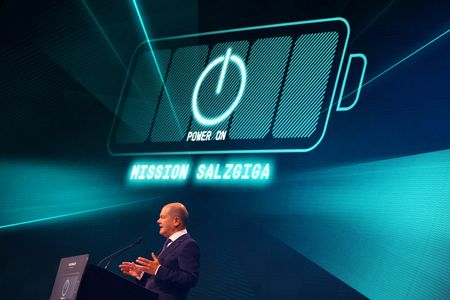By Victoria Waldersee and Andreas Rinke
BERLIN (Reuters) – German carmakers, Tesla, chip producers and battery maker Northvolt met the German chancellor and cabinet ministers on Tuesday to discuss topics from European law on vehicle emissions to energy prices, according to two participants.
The annual summit was formerly only for carmakers but was this time dubbed a “mobility” summit, with the broader focus signalled by Northvolt’s presence on the guestlist for the first time.
Tesla, was not on the first draft of the guest list shared with participants but was present, according to a participant, alongside German carmakers Volkswagen, BMW, Mercedes-Benz and Opel.
Associations, including cyclist club ADFC and rail association “Allianz pro Schiene”, criticised the summit as still too car-focused. “It’s a new label with the same content,” Dirk Flege of Allianz pro Schiene said in a statement.
While the agenda items ranged widely from car connectivity to supply chain resilience, the topics discussed in most depth were Euro 7 legislation on car emissions standards – which carmakers criticise as diverting their focus from electrification – and lower energy prices for industry, according to one of the participants.
German chancellor Olaf Scholz, Economy Minister Robert Habeck, Transport Minister Volker Wissing and Labour Minister Hubertus Heil were among those present from the government, the other participant said. Both asked not to be named.
The car sector clashed late last year with the coalition government over how Germany should relate to China as car business leaders are concerned the coalition would put its ties with the country at risk.
In a statement following the meeting, the chancellery said “one-sided dependencies on individual suppliers or sales markets can become a risk to economic performance and growth”.
Participants said the meeting should take place more frequently, the statement said, and “will continue to work closely together on topics such as raw material supply, battery cell production and semiconductor production to make Germany and Europe even more resilient.”
(Reporting by Victoria Waldersee, Andreas Rinke, Tom Sims; editing by Barbara Lewis)

